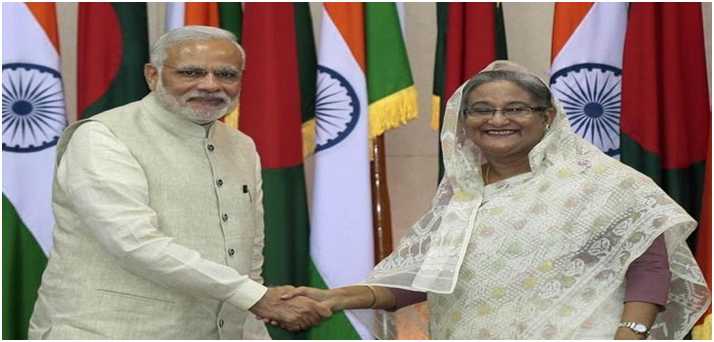A lot is at stake for India-Bangladesh ties (GS Paper 2, International Relation)

Context:
- Bangladesh’s Prime Minister Sheikh Hasina will be visiting India from September 5 to 8, 2022.
Trade:
- Following the conclusion of the seventh round of the India-Bangladesh Joint Consultative Commission in June, the two neighbours have expanded their partnership to include Artificial Intelligence, Fintech, cybersecurity, startups, and connectivity.
Comprehensive Economic Partnership Agreement (CEPA):
- Trade will be a focal point during her visit as the two countries gear up to sign a Comprehensive Economic Partnership Agreement (CEPA). The two Prime Ministers are also expected to inaugurate a joint venture power plant soon.
CEPA comes at a time when Bangladesh is set to lose the duty-free and quota-free market-access facility to India after 2026 when it graduates to a developing country.
Bilateral trade:
- Bangladesh is India’s sixth largest trade partner with bilateral trade rising from $2.4 billion in 2009 to $10.8 billion in 2020-21.
- Bangladesh imports critical industrial raw material from India on which its exports are reliant. Bangladesh’s exports could rise 182% under a free trade agreement. This could become 300% if combined with trade facilitation measures and reduced transaction costs. Bangladesh also could improve several manufacturing industries by leveraging Indian expertise in service sectors.
Connectivity:
- India and Bangladesh have implemented several projects to boost eastern India-Bangladesh connectivity. India’s connectivity projects with ASEAN and Bangladesh will open up the region to economic growth.
- Bangladesh has expressed its interest in joining the India-Myanmar-Thailand highway project.
- India-Bangladesh bilateral waterway trade will get boosted as India can now use the Mongla and Chittagong ports. India is rallying Bangladesh to divert its exports through Indian ports in place of Malaysian or Singaporean ports.
- Enhancing connectivity through India’s Northeast and Bangladesh is important for bilateral cooperation. Currently, three express trains and international bus services operate between Indian and Bangladesh.
Unresolved Issues:
Teesta water sharing:
- The sharing of the waters of the Teesta has remained a thorny issue between the two countries since 1947. For West Bengal, Teesta is important to sustain its impoverished farming districts which comprise 12.77% of its population.
- For Bangladesh, the Teesta’s flood plains cover about 14% of the total cropped area of the country and provide direct livelihood opportunities to approximately 7.3% of the population. The countries are expected to sign at least one major river agreement during the upcoming trip.
Illegal Migration:
- In 2015, India and Bangladesh resolved the decades-long border dispute through the Land Swap Agreement.
- Indian Home Minister recently reviewed the security arrangements in the Assam-Meghalaya-Bangladesh tri-junction, which used to a smugglers’ route.
- In 2019, India enacted the National Register of Citizens and the Citizenship (Amendment) Act, which created an uproar within and beyond the borders.
- The detainees caught at the border that year claimed they were Bangladeshi citizens who were returning to the country on failing to obtain Indian citizenship.
Bangladesh-China-Pakistan:
- Chinese inroads into the neighborhood have been a cause of worry for India. China has been actively pursuing bilateral ties with Bangladesh. Bangladesh had successfully approached China for a mega project to enhance Teesta river water flow.
- Bangladesh also requires China’s support in resolving the Rohingya refugee crisis. Bangladesh is the second biggest arms market for China after Pakistan.
- Bangladesh has also been warming up to Pakistan. The two shared frosty ties for decades after Pakistani politicians made unwarranted comments on the International Crimes Tribunal set up by Bangladesh. Although memories of 1971 remain, Bangladesh has expressed its interest in establishing peaceful relations with Pakistan.
Conclusion:
- In Bangladesh, there is a prevailing perception that India’s goodwill towards the country is aligned to one particular political ideology or school of thought as opposed to Bangladeshi society at large. For India, the challenge is to earn the trust and confidence of Bangladeshis across the spectrum and strata.
- Ms. Hasina has deepened ties with the Narendra Modi government, but the two have failed to resolve long-standing issues such as Teestawater-sharing and killings at the border. The question is, how these factors may affect elections in Bangladesh.
- For India it will take more than cosy relations with one particular government to have long-term stable relations with its most trusted friend in the neighbourhood.
- Just as Bangladeshis remain grateful to India for the generous support extended by India during the Liberation War of 1971, they are equally sensitive to being treated with respect and fairness, no matter who rules their country.


